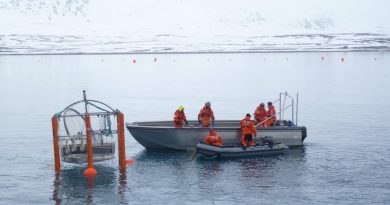NPR Series on the Arctic Investigates Greenland Huskies
NPR has sent some of its journalists to the Arctic to study the consequences of melting sea ice on the surrounding states. They are documenting their experiences in a series of blog posts. So far, correspondents have visited Iceland, Russia, and Greenland. Posts range from an illustration of the boredom huskies experience in the summer to a visit to a reindeer farm. For the dogs, with no sleds to pull across the snow, summer means endless hours of sitting around waiting to be fed. With Arctic summers becoming ever longer, it’s likely the huskies will sit around in ennui for even longer.
Interestingly, correspondent Philip Reeves says that all other dog breeds are banned in Greenland to preserve the purity of the Greenland husky breed there. The first husky is believed to have come to Greenland with the Sarqaq people, a paleo-Eskimo society, circa 3000 to 2000 BC. Later, the Vikings discovered these useful dogs and began training them as well.
The purity and ancient lineage of the Greenland husky is reminiscent of that of the Icelandic horse. Nordic settlers brought horses with them to the island during the Viking age, between 860 and 935 AD. In 982 AD, Iceland’s parliament, the Althing, forbid importing other breeds onto the Iceland, securing the stock’s purity. The quest to keep the Greenland husky and Icelandic horse genetically pure is counter-intuitive because one would expect a desire for increased diversity in order to strengthen the stock in such an isolated place.
But both husky and horse have thrived in their frigid and harsh environments without the introduction of additional genes. But now, the pressure is coming from the changing climate. Huskies, at least temperamentally, do not seem well-adapted for the longer summers that global warming is creating. Time will only tell what effect the thawing Arctic has on both its people and its pets.




